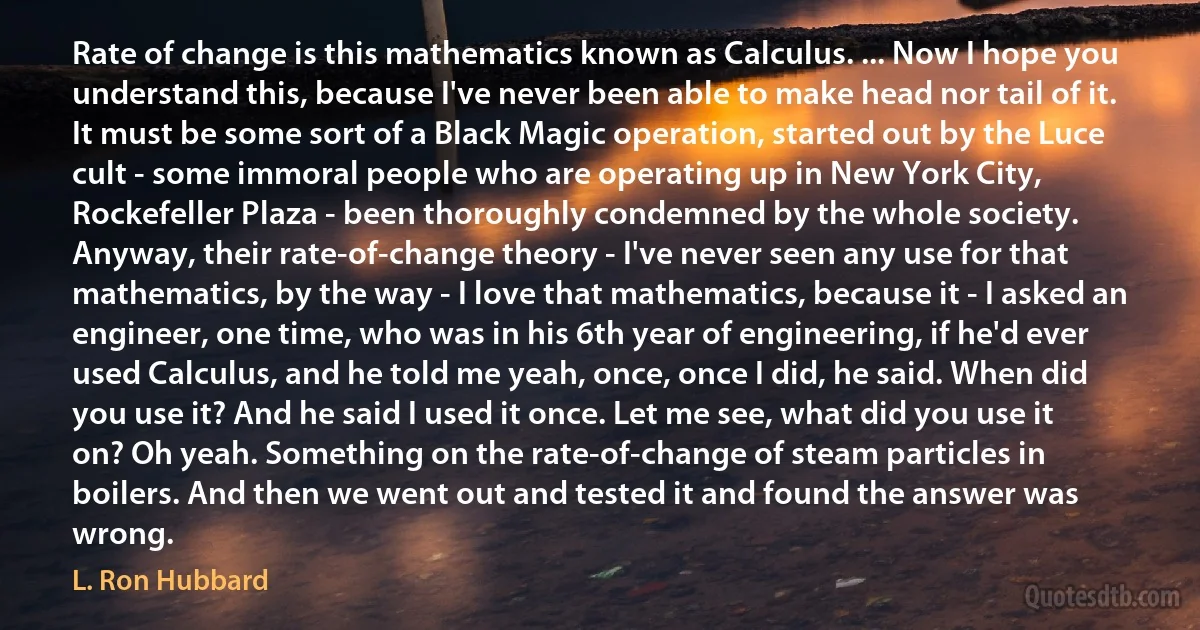
Rate of change is this mathematics known as Calculus. ... Now I hope you understand this, because I've never been able to make head nor tail of it. It must be some sort of a Black Magic operation, started out by the Luce cult - some immoral people who are operating up in New York City, Rockefeller Plaza - been thoroughly condemned by the whole society. Anyway, their rate-of-change theory - I've never seen any use for that mathematics, by the way - I love that mathematics, because it - I asked an engineer, one time, who was in his 6th year of engineering, if he'd ever used Calculus, and he told me yeah, once, once I did, he said. When did you use it? And he said I used it once. Let me see, what did you use it on? Oh yeah. Something on the rate-of-change of steam particles in boilers. And then we went out and tested it and found the answer was wrong.
L. Ron HubbardRelated topics
able answer black calculus change city cult engineer engineering found went head hope known love mathematics nor now once operation people plaza say see seen something sort tail tell time use way wrong year Rockefeller yeahRelated quotes
So it was that I gave about 1949 my 'Lecture on Nothing' at the Artists' Club on Eighth Street in New York City (started by Robert Motherwell), which predated the popular one associated with Philip Pavia, Bill de Kooning, et al. ). This 'Lecture on Nothing' was written in the same rhythmic structure I employed at the time in my musical compositions (Sonatas and Interludes, Three Dances, etc.). One of the structural divisions was the repetition, some fourteen times, of a single page in which occurred the refrain, 'If anyone is sleepy let him go to sleep.' Jeanne Reynal, I remember, stood up part way through, screamed, and then said, while I continued speaking, 'John, I dearly love you, but I can't bear another minute.' She then walked out. Later, during the question period, I gave one of six previously prepared answers regardless of the question asked. This was a reflection of my engagement in Zen.

John Cage
Ancient scriptures tell us that man is more than the physical body. In fact, we have two bodies: the physical and the astral, or subtle. But we are the soul! According to the ancient Vedic scriptures of India, the size of the soul is 1/10,000 the tip of a strand of hair. It is located in the heart region and is the actual life force. The physical, as well as the astral or subtle body, acts as a covering or costume that the soul wears in its journey throughout the material sphere. As we pass from costume to costume or from body to body through the process known as reincarnation, the impressions of previous lives imprint themselves on the subtle body and are carried with us during each lifetime. In the dream state, activity in the subtle body becomes more dominant than activity in the physical body. Our dream experiences are often impressions accumulated from many lifetimes.

Bhakti Tirtha Swami
I gave up on this stuff. I gave up on my species and ... I gave up on my countrymen. Because I think we squandered great gifts. I think humans were given great great gifts: walking upright, binocular vision, opposable thumb, large brain ... We grew. We had great gifts, and we gave it all up for both money and God ... We gave it all up to superstition, primitive superstition, primitive shit ... Invisible man in the sky, looking down, keeping track of what we do, make sure we don't do the wrong thing, if we do, he puts us in hell, where we burn forever. That kind of shit is very limiting for this brain we have. So we keep ourselves limited. And then we want a toy and a gizmo and gold and we want shiny things, and we want something to plug in that will make big big big things for us... And all that shit is nothing! It's nothing.

George Carlin
For what advantage is it, that the world enjoys profound peace, if thou art at war with thyself? This then is the peace we should keep. If we have it, nothing from without will be able to harm us. And to this end the public peace contributes no little: whence it is said, ‘That we may lead a quiet and peaceable life.' But if any one is disturbed when there is quiet, he is a miserable creature. Seest thou that He speaks of this peace which I call the third (inner, ed.) kind? Therefore when he has said, ‘that we may lead a quiet and peaceable life,' he does not stop there, but adds ‘in all godliness and honesty.' But we cannot live in godliness and honesty, unless that peace be established. For when curious reasonings disturb our faith, what peace is there? or when spirits of uncleanness, what peace is there?

John Chrysostom
Our last call in Zagreb before returning to Washington was on U. N. Secretary-General Boutros-Ghali's senior representative in the former Yugoslavia, Yasushi Akashi, whom I had known since my two visits to Cambodia in 1992. Akashi had been harshly treated by the press and castigated by critics of the U. N. for his weakness. But it was entirely not his fault: he was operating under tight constraints imposed by Boutros-Ghali. Furthermore, Akashi was virtually ignored by General Janvier and the U. N. military. (...) He was leaving Zagreb with his previously distinguished records blemished, but his mission had been doomed from the start beacuse of limits imposed from New York. The United States was delighted with his replacement: Kofi Annan (...), the U. N. official in whom we had the greatest confidence, and his arrival was good news.

Richard Holbrooke
